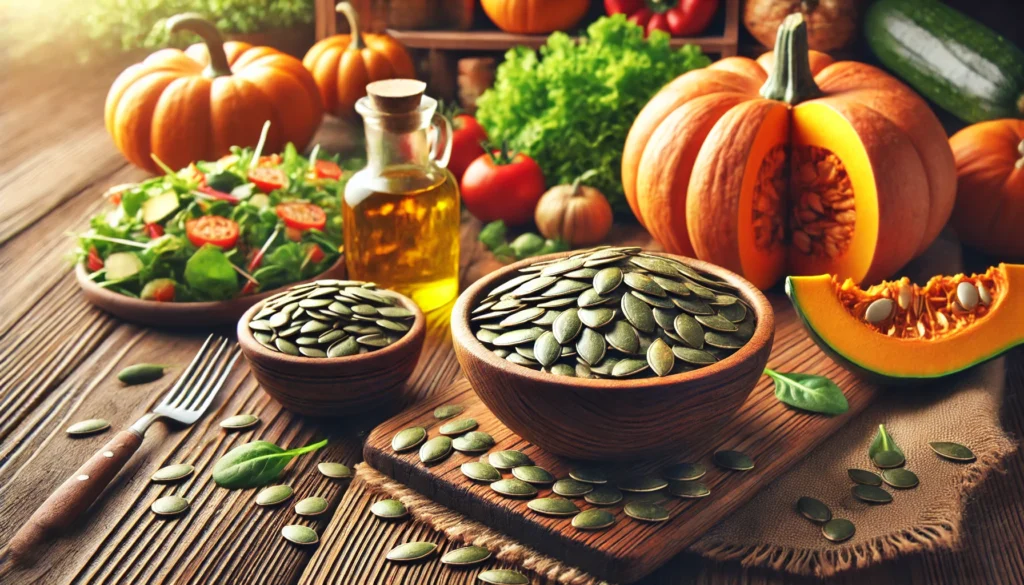7 Reasons To Add Pumpkin Seeds To Your Diet
Pumpkin seeds, also known as pepitas, are small but mighty powerhouses of nutrition. They are a rich source of essential nutrients and offer numerous health benefits.
Whether you enjoy them as a snack, sprinkle them on your salads, or incorporate them into your baking, adding pumpkin seeds to your diet can significantly enhance your overall health and well-being.
In this blog post, we will explore seven compelling reasons to include pumpkin seeds in your daily diet.

1. Nutrient-Rich Powerhouse
Pumpkin seeds are packed with a variety of essential nutrients. A 1-ounce (28-gram) serving of pumpkin seeds contains approximately:
- Protein: 7 grams
- Fiber: 1.7 grams
- Healthy Fats: 13 grams (mostly heart-healthy monounsaturated and polyunsaturated fats)
- Vitamins: Vitamin K, Vitamin E, B vitamins (especially riboflavin and folate)
- Minerals: Magnesium, manganese, phosphorus, iron, zinc, copper
This impressive nutrient profile makes pumpkin seeds a highly nutritious addition to your diet, contributing to your daily requirements for many essential vitamins and minerals.
2. Rich in Antioxidants
Pumpkin seeds are a potent source of antioxidants, including carotenoids and vitamin E. Antioxidants help protect your body from oxidative stress and reduce inflammation. Oxidative stress is linked to various chronic diseases, including heart disease, diabetes, and cancer. By including antioxidant-rich foods like pumpkin seeds in your diet, you can help protect your cells from damage and support overall health.
Key Antioxidants in Pumpkin Seeds:
- Carotenoids: Beta-carotene, lutein, zeaxanthin
- Vitamin E: Tocopherols and tocotrienols
3. Supports Heart Health
The combination of antioxidants, healthy fats, and high magnesium content in pumpkin seeds makes them excellent for heart health. Magnesium is vital for maintaining healthy blood pressure and reducing the risk of cardiovascular disease. Additionally, the healthy fats in pumpkin seeds help lower bad cholesterol (LDL) levels and increase good cholesterol (HDL) levels, further supporting heart health.
Heart-Healthy Nutrients in Pumpkin Seeds:
- Magnesium: Helps regulate blood pressure and supports heart function
- Healthy Fats: Reduces LDL cholesterol and increases HDL cholesterol
- Antioxidants: Protects against oxidative damage to heart tissues
4. Enhances Sleep Quality
Pumpkin seeds are a natural source of tryptophan, an amino acid that promotes sleep. Tryptophan is converted into serotonin, a neurotransmitter that helps regulate mood and sleep, and then into melatonin, a hormone that regulates sleep-wake cycles. Consuming pumpkin seeds before bedtime can help improve sleep quality and ensure you get a restful night’s sleep.
Sleep-Enhancing Components:
- Tryptophan: Converts to serotonin and melatonin, promoting sleep
- Magnesium: Helps relax muscles and nerves, aiding in better sleep
5. Boosts Immune Function
Pumpkin seeds are rich in zinc, a mineral that plays a crucial role in immune function. Zinc helps in the development and function of immune cells and can enhance your body’s ability to fight off infections. Including zinc-rich foods like pumpkin seeds in your diet can help strengthen your immune system and reduce the duration and severity of colds and other illnesses.
Immune-Boosting Nutrients:
- Zinc: Essential for immune cell function and development
- Vitamin E: Supports immune response and protects cells from damage
6. Supports Prostate Health
Pumpkin seeds have long been associated with prostate health, particularly due to their high zinc content and unique bioactive compounds. Studies suggest that pumpkin seeds can help reduce symptoms of benign prostatic hyperplasia (BPH), a condition characterized by an enlarged prostate gland that can cause urinary difficulties. Regular consumption of pumpkin seeds may help support prostate health and reduce the risk of prostate-related issues.
Prostate Health Benefits:
- Zinc: Important for prostate health and function
- Phytosterols: Bioactive compounds that may help reduce prostate enlargement
7. Aids in Weight Management
Despite being calorie-dense, pumpkin seeds can aid in weight management due to their high protein and fiber content. Protein and fiber help increase feelings of fullness and reduce overall calorie intake. Snacking on pumpkin seeds can help curb hunger and prevent overeating, making them an excellent addition to a weight management plan.
Weight Management Benefits:
- Protein: Increases satiety and reduces appetite
- Fiber: Promotes fullness and aids in digestion
How to Incorporate Pumpkin Seeds into Your Diet
There are many delicious and creative ways to add pumpkin seeds to your diet. Here are a few ideas to get you started:
- As a Snack: Enjoy pumpkin seeds on their own, roasted and lightly salted for a tasty and healthy snack.
- Salad Topping: Sprinkle pumpkin seeds on your salads for added crunch and nutrition.
- In Baking: Add pumpkin seeds to bread, muffins, and cookies for a nutritious twist.
- Smoothies: Blend pumpkin seeds into your smoothies for a protein and nutrient boost.
- Granola: Mix pumpkin seeds into homemade granola or trail mix.
- Soups and Stews: Garnish soups and stews with pumpkin seeds for added texture and flavor.
- Yogurt and Oatmeal: Top your yogurt or oatmeal with pumpkin seeds for a nutritious and satisfying breakfast.
Conclusion
Pumpkin seeds are a versatile and nutritious addition to any diet. From supporting heart health and enhancing sleep quality to boosting immune function and aiding in weight management, the benefits of pumpkin seeds are numerous. By incorporating pumpkin seeds into your daily meals and snacks, you can enjoy their delicious flavor while reaping their many health benefits. So, go ahead and make pumpkin seeds a regular part of your diet for a healthier and more nutritious lifestyle.


